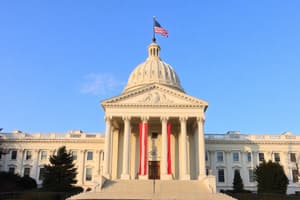Podcast
Questions and Answers
What role does the president fulfill as commander in chief?
What role does the president fulfill as commander in chief?
- Direct the army and navy to defend the nation (correct)
- Only manage foreign relations
- Control all military forces without limitations
- Provide Congress with military reports
How is the president limited in the role of commander in chief?
How is the president limited in the role of commander in chief?
By Congress's power to declare war and provide military funding.
What significant act did Congress pass in 1973 related to the president's ability to wage war?
What significant act did Congress pass in 1973 related to the president's ability to wage war?
- Gulf of Tonkin Resolution
- War Powers Act (correct)
- USA Patriot Act
- Authorization for Use of Military Force
What is a shadow war?
What is a shadow war?
What power does the president have as chief diplomat?
What power does the president have as chief diplomat?
The president can act without Congressional approval when making executive agreements.
The president can act without Congressional approval when making executive agreements.
What limitation exists for treaties signed by the president?
What limitation exists for treaties signed by the president?
Who signed the treaties handing over control of the Panama Canal?
Who signed the treaties handing over control of the Panama Canal?
During times of war, presidents often claim increased powers to _____ the nation.
During times of war, presidents often claim increased powers to _____ the nation.
What is the USA Patriot Act?
What is the USA Patriot Act?
Which president started the practice of shadow warfare following the September 11 attacks?
Which president started the practice of shadow warfare following the September 11 attacks?
What does recognition of foreign governments entail?
What does recognition of foreign governments entail?
Flashcards are hidden until you start studying
Study Notes
Commander in Chief
- The Constitution designates the president as commander in chief of the armed forces.
- Limited details in the Constitution have led to broad interpretations of this power, allowing presidents to act in defense of the nation without infringing on other branches' authority.
- Presidents can deploy military forces to address domestic unrest and assist in natural disasters.
Power to Make War
- Congress retains the exclusive authority to declare war and fund military operations, serving as a significant check on presidential power.
- Despite this, presidents have frequently engaged military forces without formal declarations, especially in conflicts in Latin America and Vietnam.
- The War Powers Act of 1973 seeks to limit the president's ability to engage troops in war without congressional approval, requiring disengagement within 60 days unless authorized by Congress.
- Various administrations have debated the effectiveness and application of the War Powers Act.
Military Operations and Strategy
- The president is responsible for major military policy decisions but is a civilian, often receiving advice from military leaders.
- Regular updates from military and national security leaders inform the president on threats and global developments.
Shadow War
- The U.S. has engaged in covert "shadow wars," using special operations, private contractors, and drones against terrorism since 2001.
- These operations are conducted primarily by the CIA and Pentagon under presidential authority, often remaining classified to limit public accountability.
- The shadow warfare approach has raised concerns about transparency and potential shifts in the CIA's role.
The Presidency in Times of War
- Presidents often claim expanded powers during wartime, supported by Congress through special legislation, such as the USA Patriot Act post-9/11.
- The Patriot Act allows broad powers for surveillance and detention of terrorism suspects, sparking debate over civil liberties.
- The Department of Homeland Security was created for better anti-terrorism coordination after the 9/11 attacks.
- Supreme Court rulings have limited executive power regarding indefinite detention and military tribunals for suspected terrorists.
Chief Diplomat
- The president directs foreign policy, negotiates treaties, and recognizes foreign governments, acting as the nation’s chief diplomat.
- Congressional approval is required for treaties, with a two-thirds Senate majority necessary for ratification.
Treaties and Diplomatic Resolutions
- The Senate holds significant power in treaty approval, often delaying or rejecting proposed agreements.
- Congress can pass foreign policy legislation and restrict funding related to diplomacy.
- Presidents leverage access to classified information and the ability to act decisively as advantages over Congress in foreign policy matters.
Executive Agreements
- The president can make executive agreements with foreign governments, which carry the same legal weight as treaties but do not require Senate consent.
- Executive agreements are often used for routine matters but have also been employed for significant international arrangements.
- A 1972 law mandates the disclosure of executive agreements, although some presidents have bypassed this requirement for security reasons.
Recognition of Foreign Governments
- The president determines the U.S. stance on recognizing foreign governments and decides official relations with them.
- Recognition can serve as a strategic foreign policy tool, exemplified by the non-recognition of Cuba since 1961 and the recognition of the Libyan opposition in 2011.
Studying That Suits You
Use AI to generate personalized quizzes and flashcards to suit your learning preferences.




